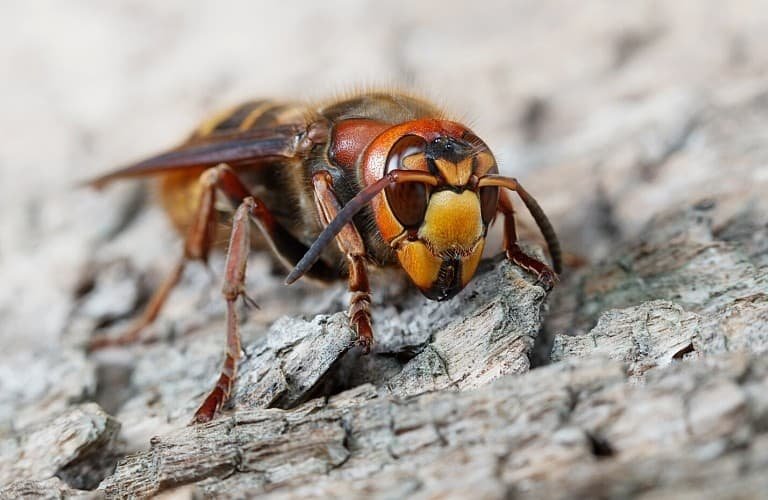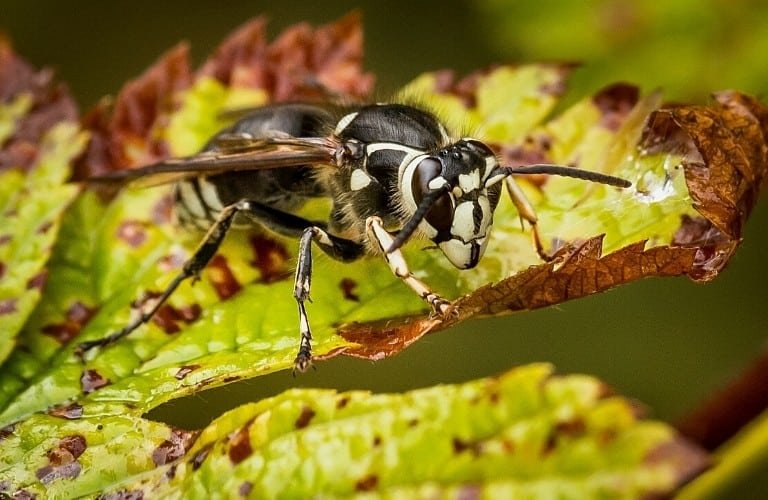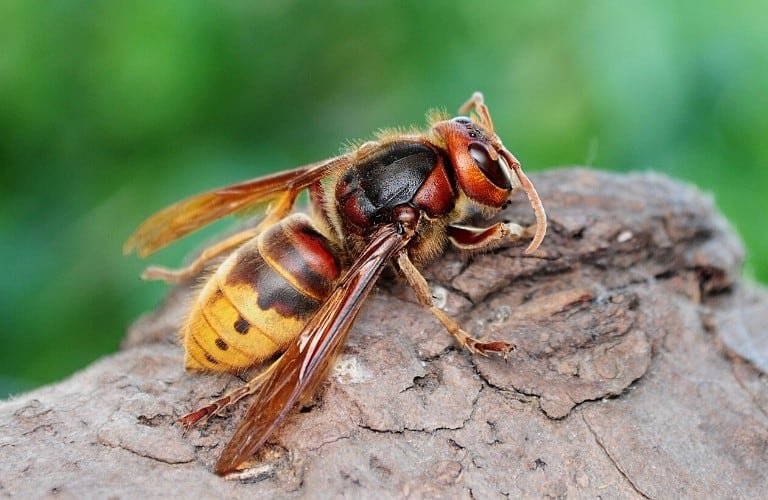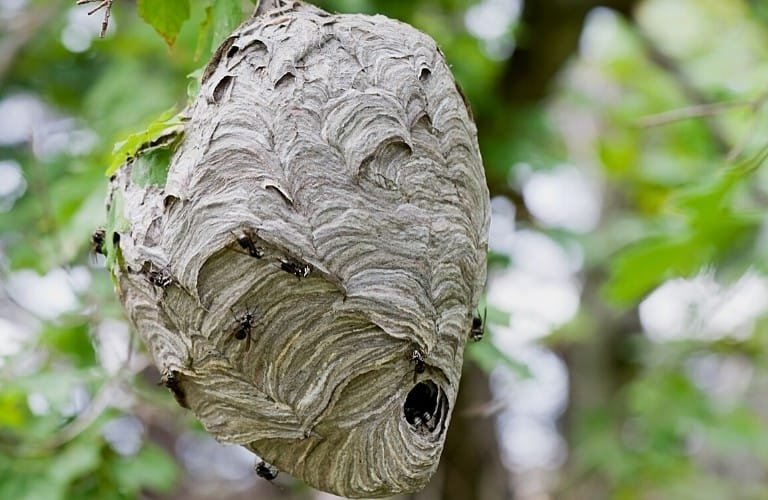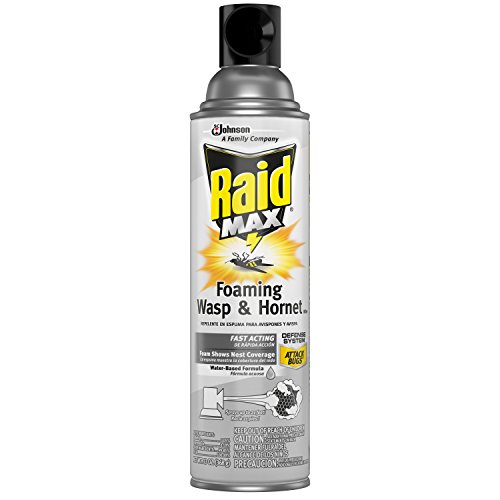Hornets build their nests in trees, eaves, house siding, and occasionally in attics.
They can be invasive insects that scare people and can be lethal for those allergic to the venom. Getting rid of hornet nests can bring a lot of comfort to a household.
What is the best hornet nest spray? Pesticide foam sprays that expand to cover large areas and fill in crevices are ideal for hornet nests as they will kill nearly all hornets in the nest on contact. Liquid pesticide sprays that kill on contact and have residual killing power are effective as well.
Most sprays for hornet nests contain pesticides that will quickly kill upon contact; however, some are more effective than others.
In the following, you’ll learn about the strengths and weaknesses of different options so you can choose what will work best for your household.
Check with all of our hornet guides and articles for important hornet info, key prevention tips, and effective removal methods.
Best Practices for Preventing an Infestation
Hornets are pretty large, usually measuring between 1 and 2 inches.
Some are black and white, such as the bald-faced hornet, and others are black and yellow or brown and yellow, like the European hornet.
Hornets are incredibly territorial, so standing near their nest can be enough of a reason for them to declare war on you.
Wasps and yellow jackets behave similarly, although yellow jackets are arguably even more aggressive.
Hornets are inactive at night and will die off in the winter. These are the prime times to try to get rid of their nests.
Be sure to read our article “Common Questions About Hornets” for definitive answers to common concerns about these stinging pests.
Bald-Faced Hornet
European Hornet
Hornet Nest
Basic Guidelines
There are a few things you can do to help keep hornets out of your yard and home.
Keep Garbage Cans Clean and Shut
Although hornets usually eat nectar from flowers, they are attracted to garbage and will eat the things that are appetizing to them.
If lids are left open on the cans in your yard, you’re inviting hornets and all sorts of other pests to a buffet.
Make sure you keep the lids closed and repair any holes that are in the cans. If trash falls out of the bags, clean it out of the cans as soon as possible.
Seal Up Cracks
Hornets can find their way inside your house from all sorts of nooks and crannies.
They can fly in when you open a door, crawl through a hole in a broken screen, or enter holes in the siding.
Holes in the roof can easily let them into your attic, which is a place most hornets like to build nests.
When you notice a crack or other opening in your home, seal it up as soon as possible.
Make it a routine during the transition of winter to spring to check for openings since early spring is when queen hornets search for places to start a colony.
Plant Flowers Away From Your Home
Hornets are pollinators who prefer to eat the nectar of flowers.
Do they use this nectar to make honey like honeybees do? Head over to this article to find the answer.
If you frequently have hornets around your home, try to plant flowers as far away from your home as possible, preferably near trees.
This will provide hornets food and offer a suitable place to build a nest away from your home. It may be far enough that you don’t have to deal with them up close.
Hornet Nest Spray – What to Look For
Hornet nest sprays are one of the quickest and easiest solutions for getting rid of hornet nests.
Most sprays will kill on contact, which means the entire colony should be dead before tomorrow.
Most sprays work the same way, but there are a few key differences worth noting, so let’s take a look at those.
Types of Hornet Nest Spray
There are a few different types of sprays you can choose from:
Natural
These aren’t as common, but they’re safer to use inside since they don’t contain harmful chemicals.
They’re usually oil-based and contain ingredients such as peppermint oil and vegetable oil, which may stain some surfaces.
Although they’re safer, keep them away from kids and pets.
Pesticide
These contain harmful chemicals that are dangerous for the environment, people, and pets.
They shouldn’t be used indoors unless the product says you can do so.
Always follow the label directions since they will contain important safety guidelines.
Aerosol
These sprays come out as gases. They’re great for spraying individual hornets since they cover a broad area.
These are more dangerous to use since it’s easier to inhale the fumes accidentally, so always wear a mask and cover your eyes and skin when using.
Liquid
Some sprays come out as a liquid. They’re easier to spray from a distance and there’s less of a chance of it landing in your face.
Foam
These spray out as a liquid but will expand into a foam once they land.
They offer more coverage than liquid and aerosol sprays, so you’re more likely to cover the entire nest with this kind.
Effectiveness
Most sprays promise to kill on contact, which means that when the spray hits a hornet, it will be dead within a minute or two.
Some sprays may continue to kill hornets for a few days or weeks. These are beneficial since some hornets may have been away from the nest when you sprayed.
So, when they come back and go inside the nest, the residual pesticide will kill them.
Many products claim to be able to spray up to a certain amount of feet, usually 20, but you’ll need to read the fine print on the label.
Some can only reach the maximum distance if you’re standing on a roof and spraying down. Most sprays won’t be able to spray this far if it’s windy.
Safe for Use Around People and Pets
Sprays aren’t safe to use around people and pets, even if they only contain safe ingredients.
The sprays can easily be carried away by the wind and will cause eye and skin irritation. Pesticides may cause severe reactions if they’re breathed in.
You should never use pesticide sprays around children and pets.
Follow the product label guidelines in regards to using it around plants and sources of water because many of the pesticides are harmful to the environment.
Ease of Use
Sprays are easy to use, although they can be quite dangerous. Always wear protective clothing and gear, especially if you’re dealing with an active nest.
Be sure to read the product label carefully before you use it.
Reusable
Sprays aren’t reusable, and you shouldn’t try to reuse the can or bottle it came in, especially if it contained pesticides.
Disposable
Only empty cans are disposable.
If you need to throw away a can that still has some of the product in it, contact your local waste management services and ask about the proper way to dispose of it.
Pesticides are flammable and can harm the environment when they aren’t disposed of properly.
Sprays are not your only option for getting rid of hornets. Lures, traps, and repellents can be effective too. Click here for a complete elimination guide.
Best Indoor Hornet Nest Spray
Hornets are more of a problem outdoors, but sometimes a few can find their way inside.
They can occasionally build their nests inside walls, siding, or attics, which really becomes a disturbance.
Let’s take a look at several products you can use inside.
EcoSMART Organic Wasp and Hornet Killer
This hornet spray only contains natural organic ingredients. It’s an oil-based spray that relies on peppermint oil to kill hornets and wasps.
It’s safe to use in a home with kids and pets, but you should still keep them out of the area until it’s dry.
This product is safe for the environment, but since it’s oil-based, you should clean up residue left behind on plants, and it might stain surfaces inside your home.
Pros:
- Organic natural ingredients.
- No toxic chemicals.
- Will kill hornets on contact.
Cons:
- May stain surfaces.
- Will need to clean off of plants.
Ortho Home Defense Hornet & Wasp Killer
This spray will kill hornets on contact since it contains harmful chemicals.
It’s a foam spray, so it will trap hornets as it expands and will reach areas that are hard to get to.
This spray is recommended for the nests you find in attics, and you can even apply this spray around doors, windows, and other openings to prevent hornets from making their way inside.
Pros:
- Foam will trap hornets and kill them.
- Can be used in attics.
- Can be used to prevent infestations indoors.
Cons:
- Contains toxic chemicals.
- Not safe around children and pets.
Raid Flying Insect Killer
Although this product isn’t listed specifically for hornets, it does have a great reputation for killing them.
It’s an aerosol spray that kills within just a few minutes, so it’s perfect to keep around for the stray hornets that find their way into your home.
You can spray it at the hornet while it’s in the air instead of waiting for it to land.
This product can stain walls and furniture, so be sure to spray in the middle of the room away from everything.
Pros:
- Can spray at the hornet in the air.
- Doesn’t have a chemical odor.
- Kills almost instantly.
Cons:
- May ruin surfaces if sprayed too close to them.
Best Outdoor Hornet Nest Spray
It’s crucial to have an effective outdoor spray since that’s where the problems are most likely to occur. Let’s look at some of your options.
Raid Wasp and Hornet Killer Foaming Spray
This foaming spray can spray up to 21 feet, so you can be sure to keep a safe distance between yourself and the angry hornets.
The foam will expand and cover most of the area so you can be sure to kill all the hornets.
Be sure to cover the entire nest in foam so it can seep through and expand into all the crevices.
Pros:
- Sprays up to 21 feet.
- Kills on contact.
- Foam will cover all spaces inside the nest.
Cons:
- Contains harmful chemicals.
SpectracidePRO Wasp & Hornet Killer
After you spray a hornet nest with ordinary spray, there may be a few survivors or stray hornets that try to come back to the nest.
This spray will continue to kill for up to four weeks, so you can be sure that there won’t be any left.
This is a liquid spray so it may be more difficult to achieve full coverage, but it will be easier to spray hornets that may be flying around the outside of the nest.
Pros:
- Continues to kill for up to four weeks.
- Kills on contact.
- Can kill hornets flying nearby as you spray.
Cons:
- Liquid spray doesn’t cover as much area as foam.
Spectracide Wasp & Hornet Killer
This aerosol spray has the longest stream distance of up to 27 feet, so it’s great to use for nests that are on tall houses and trees.
It’ll continue to kill hornets for a few days, allowing for plenty of time to kill all the hornets.
You can buy this product in packs of one, two, or 12, so you can be sure to get continual coverage. This product specifically says not to use it indoors.
Pros:
- Sprays up to 27 feet.
- Continues to kill for a few days.
- Available in multipacks.
Cons:
- Contains toxic chemicals – not to be used indoors.
Raid Wasp and Hornet Killer
This aerosol spray will kill instantly. Since it’s an aerosol spray, you can use it on individual hornets that are flying around your patio.
It comes in a pack of three, so you can have continual protection all summer long.
You can still use this for hornet nests, but you’ll need to wear protective clothing since aerosol spray gets everywhere.
Pros:
- Aerosol spray allows you to spray individual hornets.
- Kills hornets instantly.
- Three cans for long-lasting defense.
Cons:
- Doesn’t foam, so you may miss a spot.
Black Flag Foaming Wasp & Hornet Killer
This foaming spray claims to have a blanketing foam effect that will offer full coverage when you spray it on a nest.
It can also be used to spray a variety of pests from ants to spiders, so this is a good spray to keep in your pest control arsenal.
Unfortunately, the placement of the trigger on this product will cause it to drip onto your hands.
Be sure to wear gloves when using this product, and avoid touching your face and skin until you thoroughly wash your hands.
Pros:
- Blanketing foam for full coverage.
- Kills a variety of pests.
- Kills instantly.
Cons:
- Poor trigger design.
Frequently Asked Questions
What Time of Day Is Best to Spray a Hornet’s Nest?
Hornets aren’t active between dusk and dawn, so it’s better to spray the nest when it’s dark.
Hornets can’t see well in the dark, so avoid shining a flashlight in their direction so it’ll be harder for them to attack you.
Should Hornet Nests Be Removed?
Hornet nests should only be removed if they’re causing a problem or if someone is allergic to hornets’ venom.
Even with sprays, removing the nest is an incredibly dangerous task. Hornets will die out once it’s cold, and they won’t return to an old nest.
So, you can either leave their empty nest to prevent new ones from coming, or you can remove it once it’s empty.
How Can You Tell if a Hornet’s Nest Is Active?
When a hornet’s nest is active, you’ll see the hornets buzzing all around it.
The entrance is at the bottom and that’s where you’ll see most of them buzzing around.
If you see stray hornets around flowers, expect to see an active nest somewhere nearby.
All nests will be small in the spring and early summer, and they never reuse nests. So, if you see a large nest during this time, it’s most likely inactive.
Where Do Hornets Go After Nest Is Destroyed?
The hornets that didn’t get destroyed with the nest will stick around for a little bit looking for the rest of their colony.
Some hornets may try to attempt to rebuild in the same area, but many of them will probably disperse and try to live in the wild (or in your backyard).
Final Thoughts
There are many sprays on the market you can choose from.
Unfortunately, there are very few organic and natural options to choose from, so it can be difficult to find something that’s safe for your family and pets.
However, many of them kill quickly, which is ideal when you’re looking to get rid of a nest.
You should always choose something you feel safe using around your home.

